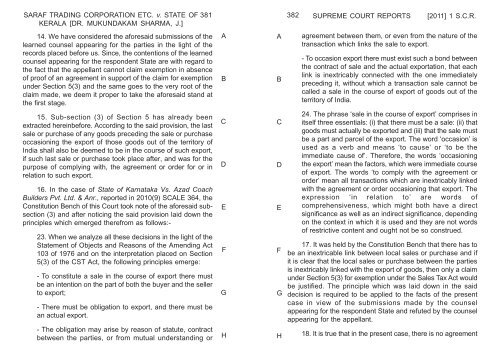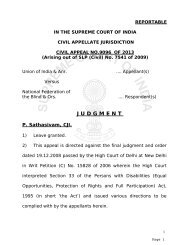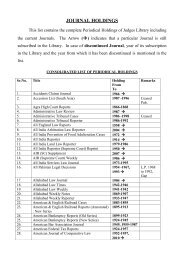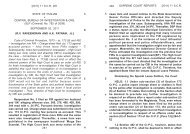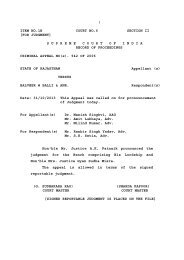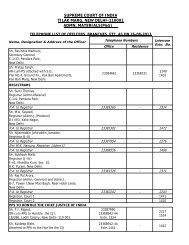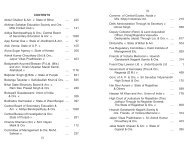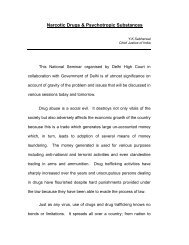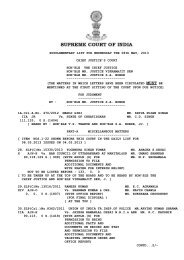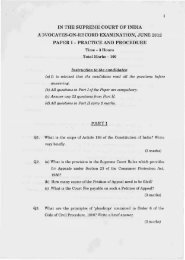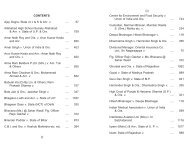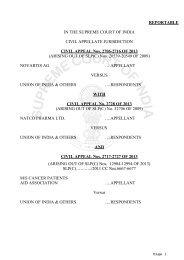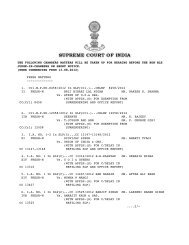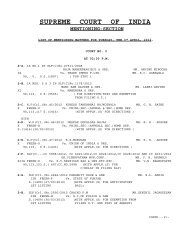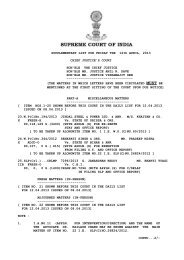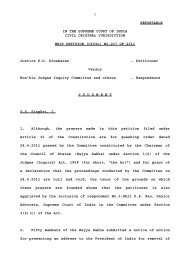Part No.II - Supreme Court of India
Part No.II - Supreme Court of India
Part No.II - Supreme Court of India
Create successful ePaper yourself
Turn your PDF publications into a flip-book with our unique Google optimized e-Paper software.
SARAF TRADING CORPORATION ETC. v. STATE OF<br />
KERALA [DR. MUKUNDAKAM SHARMA, J.]<br />
14. We have considered the aforesaid submissions <strong>of</strong> the<br />
learned counsel appearing for the parties in the light <strong>of</strong> the<br />
records placed before us. Since, the contentions <strong>of</strong> the learned<br />
counsel appearing for the respondent State are with regard to<br />
the fact that the appellant cannot claim exemption in absence<br />
<strong>of</strong> pro<strong>of</strong> <strong>of</strong> an agreement in support <strong>of</strong> the claim for exemption<br />
under Section 5(3) and the same goes to the very root <strong>of</strong> the<br />
claim made, we deem it proper to take the aforesaid stand at<br />
the first stage.<br />
15. Sub-section (3) <strong>of</strong> Section 5 has already been<br />
extracted hereinbefore. According to the said provision, the last<br />
sale or purchase <strong>of</strong> any goods preceding the sale or purchase<br />
occasioning the export <strong>of</strong> those goods out <strong>of</strong> the territory <strong>of</strong><br />
<strong>India</strong> shall also be deemed to be in the course <strong>of</strong> such export,<br />
if such last sale or purchase took place after, and was for the<br />
purpose <strong>of</strong> complying with, the agreement or order for or in<br />
relation to such export.<br />
16. In the case <strong>of</strong> State <strong>of</strong> Karnataka Vs. Azad Coach<br />
Builders Pvt. Ltd. & Anr., reported in 2010(9) SCALE 364, the<br />
Constitution Bench <strong>of</strong> this <strong>Court</strong> took note <strong>of</strong> the aforesaid subsection<br />
(3) and after noticing the said provision laid down the<br />
principles which emerged therefrom as follows:-<br />
23. When we analyze all these decisions in the light <strong>of</strong> the<br />
Statement <strong>of</strong> Objects and Reasons <strong>of</strong> the Amending Act<br />
103 <strong>of</strong> 1976 and on the interpretation placed on Section<br />
5(3) <strong>of</strong> the CST Act, the following principles emerge:<br />
- To constitute a sale in the course <strong>of</strong> export there must<br />
be an intention on the part <strong>of</strong> both the buyer and the seller<br />
to export;<br />
- There must be obligation to export, and there must be<br />
an actual export.<br />
- The obligation may arise by reason <strong>of</strong> statute, contract<br />
between the parties, or from mutual understanding or<br />
381 382<br />
A<br />
B<br />
C<br />
D<br />
E<br />
F<br />
G<br />
H<br />
A<br />
B<br />
C<br />
D<br />
E<br />
F<br />
G<br />
H<br />
SUPREME COURT REPORTS [2011] 1 S.C.R.<br />
agreement between them, or even from the nature <strong>of</strong> the<br />
transaction which links the sale to export.<br />
- To occasion export there must exist such a bond between<br />
the contract <strong>of</strong> sale and the actual exportation, that each<br />
link is inextricably connected with the one immediately<br />
preceding it, without which a transaction sale cannot be<br />
called a sale in the course <strong>of</strong> export <strong>of</strong> goods out <strong>of</strong> the<br />
territory <strong>of</strong> <strong>India</strong>.<br />
24. The phrase ‘sale in the course <strong>of</strong> export’ comprises in<br />
itself three essentials: (i) that there must be a sale: (ii) that<br />
goods must actually be exported and (iii) that the sale must<br />
be a part and parcel <strong>of</strong> the export. The word ‘occasion’ is<br />
used as a verb and means ‘to cause’ or ‘to be the<br />
immediate cause <strong>of</strong>’. Therefore, the words ‘occasioning<br />
the export’ mean the factors, which were immediate course<br />
<strong>of</strong> export. The words ‘to comply with the agreement or<br />
order’ mean all transactions which are inextricably linked<br />
with the agreement or order occasioning that export. The<br />
expression ‘in relation to’ are words <strong>of</strong><br />
comprehensiveness, which might both have a direct<br />
significance as well as an indirect significance, depending<br />
on the context in which it is used and they are not words<br />
<strong>of</strong> restrictive content and ought not be so construed.<br />
17. It was held by the Constitution Bench that there has to<br />
be an inextricable link between local sales or purchase and if<br />
it is clear that the local sales or purchase between the parties<br />
is inextricably linked with the export <strong>of</strong> goods, then only a claim<br />
under Section 5(3) for exemption under the Sales Tax Act would<br />
be justified. The principle which was laid down in the said<br />
decision is required to be applied to the facts <strong>of</strong> the present<br />
case in view <strong>of</strong> the submissions made by the counsel<br />
appearing for the respondent State and refuted by the counsel<br />
appearing for the appellant.<br />
18. It is true that in the present case, there is no agreement


